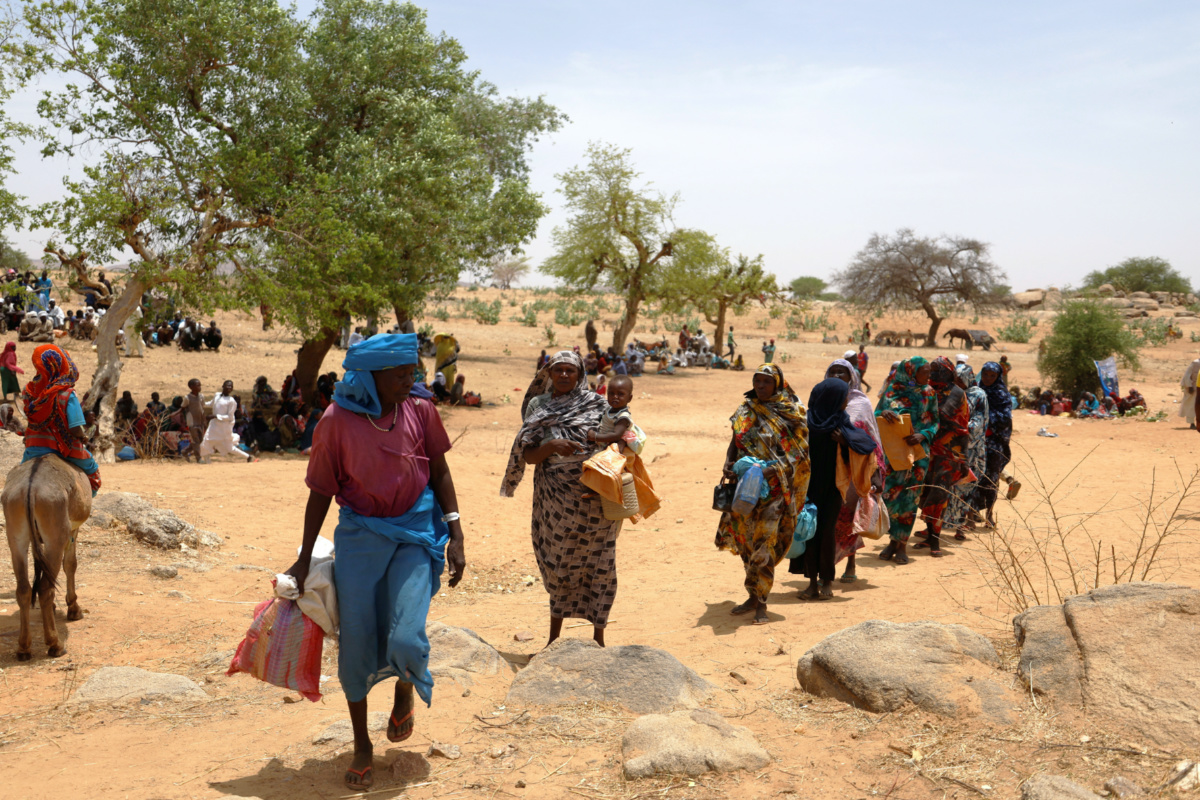Dubai, United Arab Emirates
Reuters
Sudan’s warring military factions agreed on Monday to a five-day extension of a ceasefire agreement, after renewed heavy clashes and air strikes in the capital threw fresh doubts on the effectiveness of a truce designed to ease a humanitarian crisis.
Saudi Arabia and the United States, which brokered a week-long ceasefire deal and have been monitoring it remotely, announced shortly before it was due to expire on Monday evening the parties had agreed to extend it.

Halime Adam Moussa, a Sudanese refugee who has fled the violence in her country for the second time, walks in line to receive her food portion from World Food Programm, near the border between Sudan and Chad in Koufroun, Chad, on 9th May, 2023. PICTURE: Reuters/Zohra Bensemra
Although the ceasefire had been imperfectly observed, it had allowed the delivery of aid to an estimated two million people, the two countries said in a joint statement.
“The extension will provide time for further humanitarian assistance, restoration of essential services, and discussion of a potential longer-term extension,” the statement said.
The UN World Food Programme said starting on Saturday it had been able to make its first food distributions in Khartoum since the beginning of the conflict.
Sources with knowledge of the new deal said discussions on amendments to make the truce more effective were continuing.
Hours before it was signed, residents reported battles in all three of the adjoining cities that make up Sudan’s greater capital around the confluence of the Nile – Khartoum, Omdurman and Bahri. The intensity of the fighting was greater than over the past three days, they said.
Sudan’s army and the paramilitary Rapid Support Forces have been locked in a power struggle that erupted into conflict on 15th April, killing hundreds and driving nearly 1.4 million people from their homes.
Air strikes, which the army has been using to target RSF forces embedded in neighbourhoods across the capital, could be heard in Omdurman on Monday afternoon, residents said.
“Since yesterday evening there has been bombardment with all types of weapons between the army and the Rapid Support,” Hassan Othman, a 55-year-old resident of Omdurman, told Reuters by phone. “We’re in a state of great fear. Where’s the truce?”
On past days, the truce deal had brought some respite from heavy fighting, though sporadic clashes and air strikes have continued.
Saudi Arabia and the United States have previously said both sides had committed various violations of the truce, as well as impeding humanitarian access and restoration of essential services.
We rely on our readers to fund Sight's work - become a financial supporter today!
For more information, head to our Subscriber's page.
Sudan’s health ministry has said more than 700 people have died as a result of the fighting, though the true figure is likely much higher because of the difficulty health and aid workers have had in accessing conflict zones.
The government has separately recorded up to 510 deaths in El Geneina, one of the main cities in Darfur, a western region already scarred by conflict and displacement.
In Khartoum, factories, offices, homes and banks have been looted or destroyed. Power, water and telecommunications are often cut, there are acute shortages of medicines and medical equipment, and food supplies have been running low.
The United Nations and aid groups say that despite the truce, they have struggled to get bureaucratic approvals and security guarantees to transport aid and staff to Khartoum and other places of need.
The WFP said it had begun three days of distributions in the capital on Saturday and had reached more than 12,000 people in Omdurman in areas controlled by the army as well as the RSF. It said it plans to reach at least 500,000 people in Khartoum.
The WFP expects up to 2.5 million people in Sudan to slip into hunger in the coming months, raising the number of people affected by acute food security to more than 19 million, or 40 per cent of the population.
The head of the UN refugee agency told Reuters that a projection that one million people could flee Sudan by October may prove a conservative estimate.
More than 350,000 people have already fled into neighbouring countries, with most heading to Egypt, Chad and South Sudan.
– With AHMED ELIMAN in Dubai, United Arab Emirates






